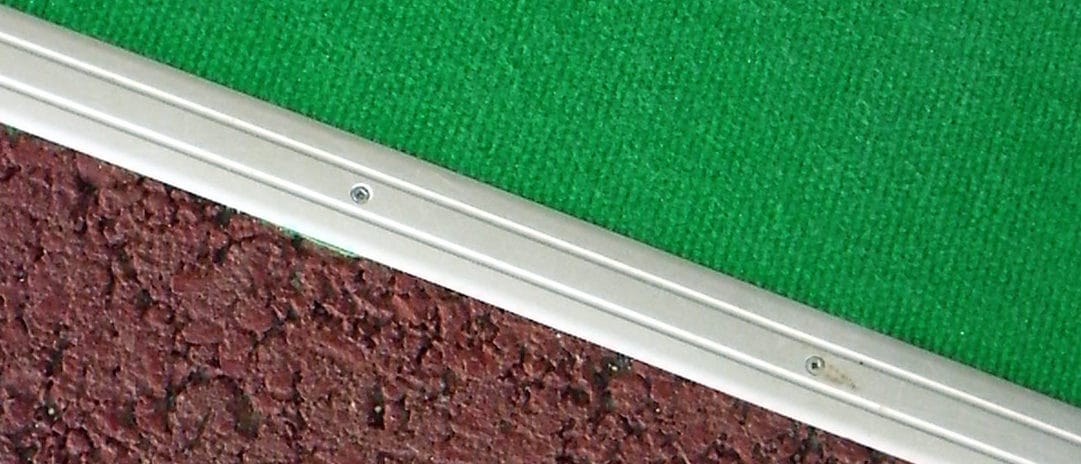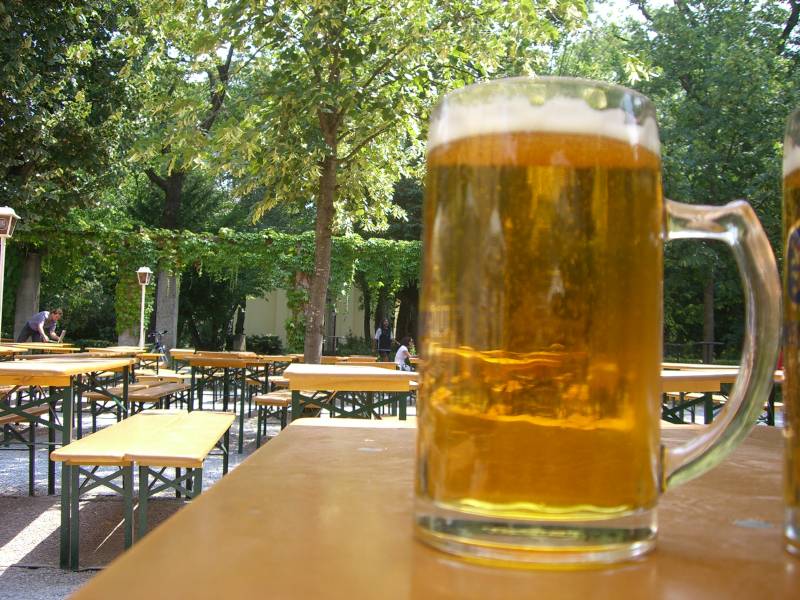von Annik Rubens | 17. Mai 2010 | Absolute Beginner, SG Podcast-Episode
Hello and welcome to the series „Absolute Beginners“ here at Slow German. There will be new episodes as before, but I will include a few episodes for absolute beginners. They are meant for people who for example are travelling to Germany and who want to speak a few words in the native language… The first one of these was published some time ago, and today I want to give you all the vocabulary you need to go to a restaurant and eat something. After all, I don‘t want you to starve here in Germany!
At first if you enter the restaurant, you might be greeted by a waiter. This is not at all common in Germany – most people just seat themselves. So if you don’t see somebody steering towards you, feel free to choose yourself where you want to sit. In case a waiter welcomes you, he might ask „Haben Sie reserviert?“ or „Haben Sie eine Reservierung?“. He wants to know if you have made a reservation in advance. You can say, „Nein, tut mir leid“, meaning „No, I’m sorry“, or „Ja, auf den Namen Schmidt“. Of course you have to replace the name Schmidt with your own name.
The waiter might also ask you: „Für zwei?“, meaning „For two?“, if he sees that there are two people in your party. Or „Für vier?“ if there are four. He will then show you to a table that’s big enough for all of you.
Usually, the waiter should present you with the menu without being asked for it. If he’s having a busy day or simply forgot his duty, you might remind him with „Die Speisekarte, bitte.“ meaning „The menu, please“. You can also say: „Kann ich die Karte haben?“, „Can I have the menu?“
Most waiters are not very talkative, so don’t expect them to introduce themselves and ask things like „What would you like to drink today?“. They most simply say: „Zum Trinken?“, meaning „To drink?“. Then they wait for you to answer. Now I don’t know what you would like to order, but I have a few alternatives for you:
„Eine Apfelschorle, bitte.“. Apfelschorle is the favorite non-alcoholic drink of Germans, it is a mix of mineral water and apple juice. „Eine Apfelschorle, bitte.“
„Einen Orangensaft, bitte.“. An orange-juice, please.
„Eine Cola, bitte.“ A coca-cola, please.
„Ein Mineralwasser, bitte.“ Sparkling mineral water, please.
„Ein stilles Wasser, bitte.“
Or, of course, „Ein Bier bitte.“. I guess I don’t have to translate that.
Now let’s think about food. You pick something from the menu and say „Ich hätte gerne…“, and then you say what you would like to eat. If you can pronounce it, I am very proud of you. For example you can order a Schnitzel and say „Ich hätte gerne das Wiener Schnitzel“. If you are a little shy, just say „Ich hätte gerne das hier“, and point to what you would like to have on the menu. If you want something special that you can’t find on the menu, just ask: „Haben Sie …?“. For example: „Haben Sie ein Wiener Schnitzel?“. It simply means: Do you have a Wiener Schnitzel?
Let’s hope everything worked out fine and you’re sitting there with your drink and your food. The waiter will wish you „Guten Appetit“, literally meaning he wishes you a healthy appetite. But something is missing. Just call the waiter by establishing eye-contact, maybe raising your hand and saying „Entschuldigung“, meaning simply „Excuse me“. Then wait until he or she comes to your table. In former times people said „Herr Ober“ or „Fräulein“, but that is thought to be old-fashioned today and some waiters and waitresses even consider it to be rude.
Finally, just ask: „Könnte ich bitte Salz haben?“ if you want to have salt. I give you some more examples:
„Könnte ich bitte eine Gabel haben?“ means „Could I have a fork, please?“
„Könnte ich bitte ein Messer haben?“ means „Could I have a knife, please?“
„Könnte ich bitte einen Löffel haben?“ means „Could I have a spoon, please?“
„Könnte ich bitte einen Aschenbecher haben?“ means „Could I have an ashtray, please?“ But be careful: Most restaurants nowadays are smoke-free.
If you have to use the bathroom, you can ask: „Entschuldigung, wo ist die Toilette?“.
At the end of your meal, the waiter will clear the table and say something like „Hat’s geschmeckt?“, he wants to know if you enjoyed your meal. You can simply answer by saying „Ja, danke.“, or if you really liked it, say „Sehr gut, danke.“.
You can then order some coffee or dessert, and if you’re done, ask for the cheque by saying „Die Rechnung, bitte.“ or „Ich möchte zahlen, bitte!“. Remember, there’s one big difference between dining in Germany and dining in the US. In Germany, you can usually sit at a table as long as you want. After your meal, you can just sit there and enjoy your coffee or drink some more wine or beer and just talk for hours. You don’t have to rush out of the restaurant as soon as you’re done eating. But it is polite to not sit at an empty table, but order some drinks.
That’s it for now – for more information on this podcast visit slowgerman.com or check out the new iPhone app. You can also follow Slow German on Twitter and Facebook. Have fun learning German and Auf Wiederhören!

von Annik Rubens | 6. Juli 2009 | Absolute Beginner, SG Podcast-Episode
]Hello and welcome to a new series here at Slow German. There will be new episodes as before, but I will include a few episodes for absolute beginners. They are meant for people who for example are travelling to Germany and who want to speak a few words in the native language…
First of all, you want to be able to say yes and no. That’s the easy part. If you want to say yes, say „Ja“. „Ja“. If you want to say no, say „nein“. Nein.
When travelling in a foreign country, it is important to be nice to the people you meet. After all, everything you do will reflect on your own country. If you’re an American and you’re acting loud the Germans will say: Americans are loud! So be careful what you do!
Our next words are please, thank you and sorry or pardon. If you want to thank somebody for something, you simply say „Danke“. Danke. In reply to that, the other person will answer „bitte“. Bitte. If you want to attract the attention of somebody, for example a person working in a store, or if you bump into somebody, you say „Entschuldigung“. I know this is a hard word to say and everybody will understand if you say „sorry“, but the correct German word is Entschuldigung. Ent-schul-di-gung.
Alright, very good so far! Now let’s get to four words that you can use for directions. There is left and right. Left is links, links, and right is rechts, rechts. It’s easy to memorize, because the first letter of the words is the same. Links and rechts. In rechts you have a sound that is not common in many other languages, the „ch“-Sound. Your mouth forms a wide grin, like if you want to say „eeeee“. Now if you lift the middle part of your tongue a little bit, you will get this sound. „Ch“. Two more words for directions: Up and down. Up is „oben“, oben, and down is „unten“, unten.
Let’s get to different greeting formulas. You can always say „Guten Tag“, no matter what time it is. It jus means „A good day to you“. If you want to specify, you can wish a good morning or good evening. Then it is „Guten Morgen!“ or „Guten Abend“. Guten Morgen. Guten Abend. The more colloquial form is „Hallo“. Hallo. If you are in Southern Germany, in Bavaria or even in our neighbor-country Austria, you will often hear „Grüß Gott“. This means „God is greeting you“, meaning „God bless you“. I am not a Christian and I say it anyway – it is very common in Southern Germany. Grüß Gott.
If you want to leave, there are also different possibilities. You can say „Auf Wiedersehen“, auf Wiedersehen, meaning „until we see us again“. The more colloquial form is „Tschüss“ or the Italian „ciao“. Tschüss. Ciao. Auf Wiedersehen!
Four more words to go, then we are through with this first episode of Slow German for Absolute Beginners. Let’s say you enter a hotel, or you want to introduce yourself to somebody. Then you say „Ich heiße…“ and then your name. I would say „Ich heiße Annik“. In a hotel, you would follow up with something like „Ich habe eine Reservierung“, if you have a reservation for a room. We also copied the English form of that sentence, so you can also introduce yourself by saying „Mein Name ist…“. Mein Name ist Annik.
Ok, now three important places for every traveler. If you travel by train, you need the trainstation. Bahnhof. Bahnhof. If you fly to Germany, you will arrive at the airport, the Flughafen. Flughafen. And if you need a taxi, guess what? You can call a Taxi! I guess that word is the same in almost every language. We just pronounce it a little differently. Taxi. Taxi.
That’s it for now, in the next easy episode I will tell you what to say if you’re in a restaurant. If you have questions or ideas what to teach next, write me an e-mail at podcast@slowgerman.com . You can find the text and the vocabulary to this episode as well as many infos on slowgerman.com. Auf Wiedersehen! Or better: Auf Wiederhören!

von Annik Rubens | 19. Juni 2007 | Essen & Trinken, SG Podcast-Episode
Ich lebe in Bayern, genauer gesagt in München. Und hier gibt es eine Tradition, die Ihr vielleicht kennt – Biergärten. Ein typischer Biergarten hat orangefarbene Bänke und Tische. Der Boden ist mit kleinen Kieselsteinen bedeckt. Große Kastanienbäume spenden Schatten.
Aber das ist noch nicht alles: Ein richtiger Biergarten in Bayern ist in zwei Bereiche unterteilt. In einem Bereich wird man von einem Kellner oder einer Kellnerin bedient. Diesen Teil erkennt man meistens daran, dass hier Tischdecken auf den Tischen zu sehen sind. Der andere Teil ist der wichtigere: Hier darf man sich sein Essen selber mitbringen! So sieht man also Einheimische, die ihre eigenen Tischdecken ausbreiten und aus Körben allerlei leckeres Essen zaubern. Das Bier und die anderen Getränke jedoch muss man an kleinen Ständen im Biergarten kaufen.
Traditionelle Biergärten schenken Bier nur in Krügen aus, die für Nicht-Bayern riesig sind: Ein ganzer Liter Bier passt hier rein, und das Glas nennt man somit nicht mehr Glas, sondern Mass. Essen kann man auch kaufen, falls man nichts mitgebracht hat. Es gibt meistens gegrillte Würstchen, halbe Hähnchen, oft auch gebratenen Fisch, Steckerlfisch genannt. Lecker finde ich vor allem die kalten Brotzeiten: Käse mit einer riesigen Breze, Radi (das ist Rettich) mit Salz oder der berühmte Obazda.
Obazda ist eine orangefarbene Masse, die man sich auf ein Brot oder eine Breze schmieren kann. Er besteht aus Camembert, Zwiebeln, Paprikapulver, Butter und ein wenig Weißbier.
Es ist übrigens ganz normal, sich zu anderen, fremden Leuten an den Tisch zu setzen, denn ein Biergarten ist Zeichen für Geselligkeit. Und noch ein Hinweis, damit es keine Verwirrung gibt: Ein Biergarten bedeutet nicht, dass Männer dort hingehen, um sich zu betrinken. Ein Biergarten ist Kultur. Hier treffen sich Freunde, Familien gehen mit ihren Kindern hierher, Geschäftsmänner treffen sich mittags hier zum Essen. Es geht um Gemütlichkeit, nicht um Alkohol.
Große Biergärten übrigens haben Platz für 7000 bis 8000 Menschen – und sie sind an schönen Sommertagen randvoll! Wer also in nächster Zeit nach München kommt – ich empfehle den traditionellen Augustiner Biergarten in der Nähe des Hauptbahnhofes! Und keine Angst: Natürlich gibt es hier auch nicht-alkoholische Getränke.
Text der Episode als PDF: https://slowgerman.com/folgen/sg08kurz.pdf




